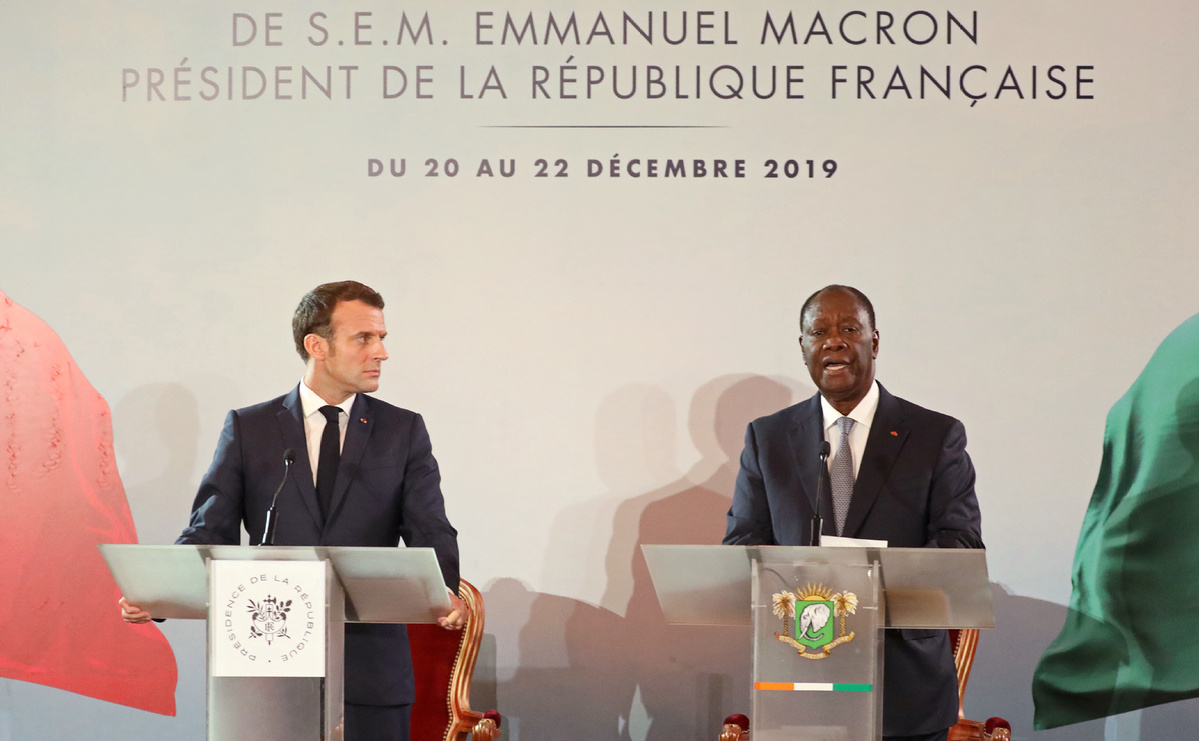West African states moving to new currency
Move touted as reducing French influence, but more symbolism than substance seen

Move touted as reducing French influence, but more symbolism than substance seen

The France-backed CFA currency, used widely across West and Central Africa, will this year make way for a successor, the eco, in a move that reduces the former colonial power's influence over the shared currency.
As part of the reform, coinciding with the arrival of a new decade, the eight countries using the eco will no longer be required to keep half their foreign reserves in France, as is the case with the CFA.
The proposed switch to the eco was revealed by Cote d'Ivoire President Alassane Ouattara during a visit by his French counterpart Emmanuel Macron to the West African nation on Dec 22.
As with the CFA franc, the eco will be pegged to the euro, guaranteeing its stability, Ouattara said.
Macron and his Economy Minister Bruno Le Maire described the reform as "historic", with Macron pledging the eco will be unveiled sometime in 2020, according to a report by France 24.
Aly Khan Satchu, a banker and consultant to blue-chip companies across Africa, said the move is more political than economic.
"Notwithstanding the headline-grabbing nature of the pronouncement, it appears that this is a baby-steps kind of reform," Satchu said. "These Francophone African countries were coming under tremendous bottom-up pressure to exert more independence from France, their erstwhile colonial master, and this announcement serves that need."
According to Satchu, the decision by the eight countries to drop the CFA franc and withdraw reserves from the French treasury serves to assert some semblance of economic independence from the former colonial ruler but will do little to change their fortunes.
"I believe that the CFA franc was actually uniquely positive," Satchu said. "It brought currency stability and a positive feedback loop of lower interest rates.
"If you look across Africa, knee-jerk economics has triggered a collapse in currency values like that of Ghana's cedi, which has fallen for 25 consecutive years. With that in mind, I think this is a poor decision economically."
Aside from Cote d'Ivoire, the countries switching to the new currency are Burkina Faso, Togo, Niger, Benin, Guinea-Bissau, Mali and Senegal. All are former French colonies, with the exception of Guinea-Bissau.
The CFA franc, created in 1945, has long been criticized as a remnant of French colonialism. It was originally pegged to the French franc and later the euro, with France playing an important role in governing the currency.
While welcoming the move during a speech in Abidjan in Cote d'Ivoire, Macron said almost three-quarters of Ivorians never experienced colonialism and there is a need for them to build a new partnership of friendship with France.
Economic independence
Experts say that while the currency change may come as a symbolic expression of economic independence, countries in that part of Africa still need France for their survival.
According to Crispin Bokea, a financial inclusion and strategic planning specialist and economics lecturer at Kenya's Strathmore University, the move would not amount to full autonomy of monetary policy for the eight countries.
"The announcement can be seen as nothing more than a name change. The fact that the new currency is still pegged to the euro means that the monetary policy that was in place still persists," Bokea said.
Even though the Economic Community of West African States has urged members of the regional bloc to push on with efforts to establish a common currency, seven of its 15 members do not share the CFA franc.
Satchu said the eco, as currently defined, does not offer an economic rationale for its adoption by all members of the regional grouping.
Otiato Opali in Nairobi contributed to this story.

































